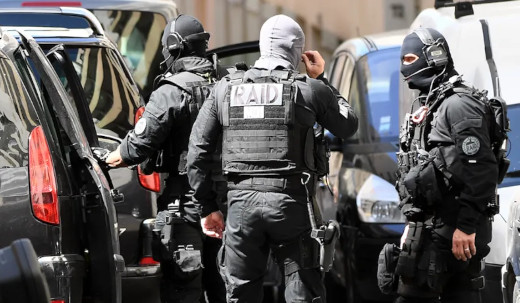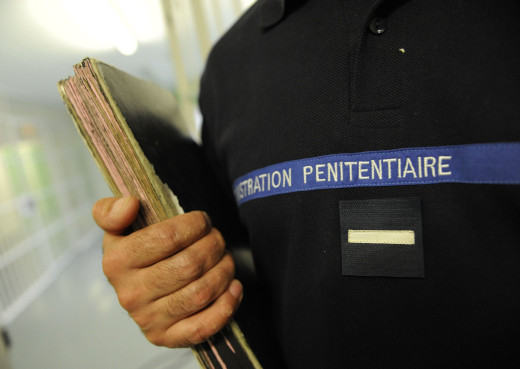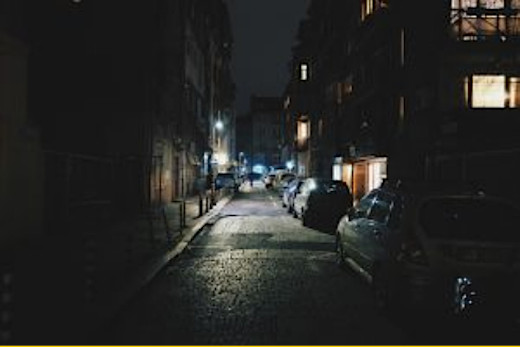The Police Raids Against MISA in France, November 28, 2023. 2. MISA Students Tell Their Stories
by Susan J. Palmer
When the heavily armed officers entered the residences of the yogis they terrorized everybody, alleged perpetrators and alleged “victims.”
Part 2 of 5. Read the first part here.
The Paris raids of November 28, 2023, against students of MISA, the Movement for the Spiritual Integration into the Absolute, and its leader Gregorian Bivolaru were carried out simultaneously and targeted five locations. One location raided was a yoga studio administered by Sorin Turc, a violinist who played with the Monaco orchestra. Three large houses that were used as yoga-meditation retreats where around 90 Romanian yogis were staying on vacation were raided, as well as small 2-room apartment where Gregorian Bivolaru was temporarily residing.

The Nice raids were conducted that same morning. There, the police targeted three buildings in the same yard in Nice’s suburbs, where twelve Romanian yogis who were working on a construction contract were staying.
When I interviewed in Bucharest in January 2024 those who had been there, my informants’ accounts of the Paris raids were all very similar. One woman spoke of how her family owned a large house with twenty-two rooms in a beautiful rural area 100 kms from Paris, and she had invited her yogi friends from Romania and other countries to visit for a spiritual retreat: “I woke up with police in my room, with masks, heavily armed. I got scared and hid under my blanket and started to pray. They threw the blanket off and cast it aside. I asked the policeman to let me get dressed, in English. He put himself between me and my clothes and pointed the gun at me. He finally let me get dressed and put handcuffs on behind my back. I was just in pyjama pants, bare feet, and a light blouse and I started to get cold. The door to the outside courtyard was open.”
A man who was staying at another spiritual retreat house also described being subjected to hypothermia: “I stood outside for an hour and a half, and it was almost zero and I was in pyjamas and t-shirt with bare feet. Then they took us downstairs to the kitchen, but they left all the doors open so it was cold. They were warm [the police] enough in boots and jackets and bullet proof vests, but we were mostly barefoot in our PJs.”
One man who was staying in a wooden cabin on the grounds of the main house described a similar experience: “I heard dogs barking, then a masked policeman came into the cabin, dragged me to the ground and put handcuffs on me. Then took me to the courtyard of the house. The police were running up and down the stairs shouting, ‘Ouvrez la porte!’ [Open the door!] and smashing in the doors. I shouted, ‘I have the keys!’ But it was too late, they had already broken all the doors and mirrors. We were twenty–twenty-five people, the police were maybe fifty.”
My informants identified four different kinds of police involved in the raid: “the masked ones with guns, the police without masks, the drug squad, and the human trafficking police—the ones who were taking videos and photos of us and communicating with their boss on the phone.”
Several Romanians were surprised by the attitude of the masked police: “They acted like they came to rescue us. They said, ‘We are here to help you.’ (I thought, but you are the ones abusing us now!).” Several of my informants noticed that the police seemed to be puzzled, as they were trying to categorize each Romanian as a “suspect,” as a “victim,” or as a “witness.” They noticed a pattern where the police were trying to discern whether their captives were suspects (of rape, trafficking, etc.), victims, or whether they might be useful as witnesses. One woman said, “It was very confusing. Some of us were treated like traffickers, others like victims— but how did they decide who was what? The Judiciary Police who took over the case told us, ‘We are part of a very big investigation that involves human trafficking, rape, psychic abuse—and you are the victims—but you don’t recognize that you are victims. We are here to help you.’ I tried to talk to my friends, but [the police] said ‘Shush!’ We were not allowed to speak at all. Very weird.”

Those detainees who understood French reported overhearing the police express their uncertainty and surprise. One woman said: “I signed everything. I tried to be very open and honest, but it was difficult to understand what they wanted. It seems it was not clear to them either. I understand a bit of French and they were speaking between themselves saying, ‘Who are these people? It is not like what we were told it would be’.”
As mentioned earlier, three houses in the same yard in the suburbs of Nice were raided, where twelve Romanian construction workers were staying. One man from the Nice raids told me his story. He was around 6’6” tall and very strong. He explained how he often traveled to France to work on contracts with his team of construction workers, all members of the MISA yoga school in Bucharest: “Me and my friends we prefer to work together. We find it difficult to work with people who are drinking and smoking [something MISA students do not do]—it leads to problems.”
These workers were guests of Sorin Turc, the already mentioned musician who was a yoga teacher at one of the schools affiliated with Atman. The violinist owned the three contiguous houses in Nice and had offered them free accommodation, with four men staying in each house.
On the morning of November 28, one of my informants told me he was in bed with the flu when he heard a crash and loud bellowing: “Police were coming up the stairs pointing big guns at me, and they told me to kneel with my hands up. Why so much force? There were around 150 police with three dogs, and they were screaming and pushing me as they put on the handcuffs. They kept us outside in the garden for three hours, squatting against the wall in handcuffs, I was freezing, shivering. I told them I was sick and needed to dress, but they would not allow me even to get my coat in the hallway. We asked if they had an arrest warrant and they said they did not need one. At first, we thought they suspected us of working in France with no papers, but we were all legal employees of a construction company. They kept asking me, ‘Where are the girls? There are supposed to be women staying in the house.’ ‘No women,’ I said, ‘only men working on construction.’ They asked, ‘Where is the room in the house for the sex video chats?’ We told them there was no internet in the whole house. So, it seems they thought we were part of a human trafficking ring. Then at the police station they told us we were ‘suspects’ and took our ID and made us fill out forms. We were held for 48 hours. ‘The FBI’ came to my cell, at least they were wearing FBI badges and spoke in English. They asked for my passwords so they could access my laptops. I refused. They later told me all my belongings had been sent to Nanterre to the prosecutor in charge of the case.”
“Suddenly, they released us all, around 10 or 11 p.m. They had taken our cellphones and our money and would not give them back to us. We were downtown in the city of Nice, 30 kilometers from our house. It was dark, cold, and raining heavily. They allowed us socks and shoes and I had my windbreaker with a hood, so I walked very fast, almost running and after five hours I arrived home. The house was not sealed, the gate was smashed in, and the front door was open, but I found my wallet with my cards still in my room, and the key to the car. So, I took the car and collected my friends who were walking home. Some of them did not take the main route, so I could not find them, and they had to walk all the way back alone in the cold rain.”

The police interrogators exerted heavy pressure on the Romanian detainees to sign documents written in French. With few exceptions, none of the Romanians read or spoke French. One detainee who had just been dragged out of bed and was handcuffed in the freezing cold kitchen was told she had to sign now: that it was mandatory, that she would be able to see a lawyer later on that afternoon at the police station—after she had already signed.
Even when interpreters were supplied who could translate the documents, the allegations listed were baffling to these Romanians and seemed irrelevant to their lives. One woman described her treatment at the Nanterre police station: “A translator and a policeman came with papers and wanted my declaration. I filled in my ID page and then there were five accusations they wanted me to sign. I didn’t understand what they had to do with me. I said, ‘What are these accusations? Why should I sign?’ They said it was mandatory, that it was ‘just a procedure.’ But I did not sign, and so I sat in handcuffs for three to four hours.”
Some of the Romanians described how they were deliberately deceived about the nature of the documents they were asked to sign. They were told it was a simple “declaration” affirming that they had been arrested, or that “it’s just a procedure.” Some of these Romanians complied, not realizing they were signing a confession to charges of human trafficking, rape, kidnapping, and abuse of weakness. One Romanian detainee even found her translator unhelpful and deceptive: “My translator said, ‘I am not going to read you these ten pages again. I am not going to translate these questions again.’ I begged her, ‘But it’s my life, my freedom! I want you to translate, I cannot sign otherwise.’ Then, on the last page of the document, I saw a note in a smaller font that read, ‘She refused to have a lawyer.’ Then I felt sick. I knew I could not trust these people.”
Source: here.
**********
About the author
Susan J. Palmer is an Affiliate Professor in the Religions and Cultures Department at Concordia University in Montreal. She is also directing the Children on Sectarian Religions and State Control project at McGill University, supported by the Social Sciences and the Humanities Research Council of Canada (SSHRC). She is the author of twelve books, notably The New Heretics of France (Oxford University Press, 2012).
yogaesoteric
March 10, 2024
Also available in:
 Română
Română
